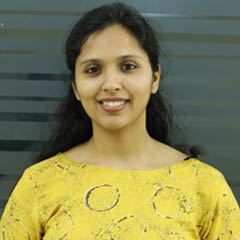Assamese singer Abhishruthi Bezbaruah’s version of ‘Aaj Jaane ki Zid Na Karo’ is so inclusive. Here’s why

Mail This Article
Abhishruthi Bezbaruah, one of Assam’s most popular Indian classical singers, believes music should be inclusive. The award-winning singer, blessed with a mellifluous voice and a rich musical lineage, is charting new territory by introducing music videos that connect with everyone. Onmanorama catches up with the talented musician, who has just released her new cover ‘Aaj Jaane ki Zid Na Karo', a music video that connects well with the hearing-impaired.
Could you speak about the new cover song?
‘Aaj Jaane ki Zid Na Karo,’ sung by the legendary ghazal singer Farida Khanum ji is very close to my heart. This latest cover is my tribute to her. I have done several cover songs as a tribute to great ghazal singers but this one is different because I have presented the song in sign language.
That’s such a noble cause. Did you face many challenges while learning the language?
Yes. Precision is very important in Indian sign language. I trained under a tutor who has been teaching me the different nuances of the language. You need to get your gestures and facial expressions right. Even a slight difference can change the way it is perceived by the other person. Definitely, there are challenges in incorporating it in my album, but it is a beautiful experience. I hope to do many more such covers.
Your earlier video ‘Ore Raati’, dedicated to the transgender community was so upbeat...
Oh yes! I was always clear that this song would be an upbeat one as I want to celebrate the lives of transgender people. I wanted to break the stereotypes of a sad song showing sympathy towards the community. Hence the upbeat number with a strong message at the end of 'embrace', 'educate' & 'empower' : embracing them as they are, educating ourselves & empowering them.
Could you share your experience working with the community for the song?
I had a wonderful experience working with the (transgender) community, although initially, I have to be honest, I was nervous and skeptical whether or not the community would talk to me (a heterosexual person) but when I put forward my thoughts, views and my aim of the song, they were more than helpful. We have a big LGBTQIA+ community in Assam and the person who got me in touch with mostly everyone in the community is Milin Dutta, a proud trans man. He is my very dear friend now.
For this song to work out, I had to do my research and study before talking to anyone. Milin helped me connect with a lot of people & they shared their stories. My lead actor is a proud trans woman herself Ms Janvi Borkakoti. Hence the music video opens with a line saying 'Inspired by Lived experiences'. I put together core common points which each individual addressed in this music video : How crucial it becomes for trans folks to change their names on paper , how difficult it gets when it comes to public toilets as there is no provision for gender neutral toilets and how difficult it gets when family doesn’t accept you.
Despite being a Hindustani classical singer, it's interesting to see you work on independent and original covers...
I like to experiment and try new things in terms of soundscape. If you listen to my Assamese folk songs like 'Roi Roi Roti', 'Tok Dekhi Mor Gaa', 'Kordoi Sokola', 'Kerumoni Thuriya' you will hear sounds of the nature. This keen interest to fuse and sync natural ambient sounds, native local instruments of Assam with electronic sound (without loosing the essence of our folk music) also comes from my experience in working in sound designing in films under Dr Resul Pookutty , Amrit Pritam. In one of my tracks named Roi Roi Roti , the track starts off with the sound of the cuckoo and we created the rhythm of the entire track in the clickity-clack of the loom where we weave our traditional outfit Mekhela chador, with sounds of the rice , waves etc. you will also notice the video and audio is in sync with the sounds. My attempt of folk fusion is with natural sound , local instruments versus just traditional and western sounds.
How did you become interested in sound design?
I have been passionate about music since a child and began my formal training in music under maestros like Guru Shri Damodar Bora of Assam, Guru Smt. Mandira Lahiri of Kolkata and Guru Shri Jiten Basumatary of Assam from six years. Though classical Hindustani music is my forte ( Abhishruthi is the disciple of Padma Bhushan Pt Rajan - Sajan Misra of the Banaras gharana), I have studied various music forms. Soon enough, my interest to learn the technical side of music also grew. This is why I decided to pursue a diploma in sound designing and music production from Whistling Woods International. In 2011, I started working with academy-award winning sound designer Resul Pookutty. I worked in films like 'English Vinglish,' 'Highway', etc.
Was music the only option you considered as a career?
Though my parents wanted their daughter to pursue a career in medicine, they were hugely supportive when I told them about my fear of blood and my passion to continue learning music. Almost everyone in my family are musicians, including my father who used to play the banjo and mandolin.
What are the efforts being made to popularise Assamese music across India?
Nowadays, we have a good Assamese representation in Bollywood. However, there is still a long way to go for our music and tradition to get the recognition it deserves across the country. It is happening slowly now, thanks to the efforts of our chief minister and prime minister. Our culture and music is also being widely appreciated wherever we perform and this brings utmost happiness.


